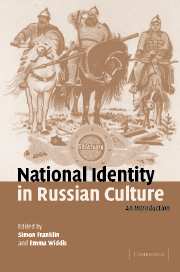Book contents
- Frontmatter
- Contents
- List of illustrations
- Notes on contributors
- Preface
- Note on the transliteration of Russian
- Map: The growth and contraction of Russia and its empire
- 1 ‘All the Russias …’?
- SECTION I IDENTITIES IN TIME AND SPACE
- SECTION II CONTRASTIVE IDENTITIES: ‘US’ AND ‘THEM’
- SECTION III ‘ESSENTIAL’ IDENTITIES
- 6 Identity and religion
- 7 Music of the soul?
- 8 Identity in language?
- 9 Byt: identity and everyday life
- SECTION IV SYMBOLS OF IDENTITY
- Afterword
- Notes
- Selected further reading in English
- Index
9 - Byt: identity and everyday life
Published online by Cambridge University Press: 04 May 2010
- Frontmatter
- Contents
- List of illustrations
- Notes on contributors
- Preface
- Note on the transliteration of Russian
- Map: The growth and contraction of Russia and its empire
- 1 ‘All the Russias …’?
- SECTION I IDENTITIES IN TIME AND SPACE
- SECTION II CONTRASTIVE IDENTITIES: ‘US’ AND ‘THEM’
- SECTION III ‘ESSENTIAL’ IDENTITIES
- 6 Identity and religion
- 7 Music of the soul?
- 8 Identity in language?
- 9 Byt: identity and everyday life
- SECTION IV SYMBOLS OF IDENTITY
- Afterword
- Notes
- Selected further reading in English
- Index
Summary
THE NAMING OF EVERYDAY LIFE
The Russian word byt means something extremely basic, but cannot be translated by a single word, or even a single phrase, in other European languages. Everyday life, daily life, quotidian existence, material culture, private life, domestic life: all of these various shades of meaning are present in the term. Sometimes, but by no means always, byt is defined by being opposed to bytie, spiritual existence: in this context, the translation of byt would come close to ‘earthly existence’ as well as to ‘material life’. Additionally, byt is sometimes used as a value-laden term – a circumlocution like ‘the dreariness of quotidian life’ would capture the flavour. At the same time, byt is often used more restrictively, to mean ‘way of life’ – as in ‘the way of life of the Russian peasant’ (krestianskii byt), for example.
It is common for analysts to move from linguistic specificity to psychological distinctiveness, and to argue that the fact that byt cannot be translated means that Russians have a different attitude to daily life from Western Europeans. In a recent article, for instance, the literary critic Igor Shaitanov observed, ‘The Russian word byt has a right to gain entry to dictionaries in foreign languages alongside “samovar”, “intelligentsia”, “borzoi”, and “sputnik”. The point is that other nations do not have byt. Nowhere else, it would seem, is there such a tense relationship with the everyday, balanced on an unstable border between hatred and an intense desire to possess and dominate.
- Type
- Chapter
- Information
- National Identity in Russian CultureAn Introduction, pp. 149 - 168Publisher: Cambridge University PressPrint publication year: 2004
- 2
- Cited by



